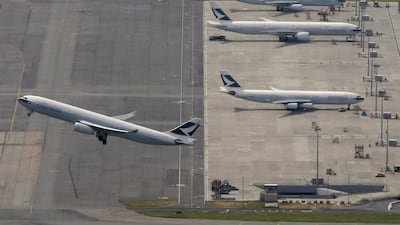The Hong Kong airline Cathay Pacific Airways’ first-half net profit tumbled 82 per cent amid slower Chinese economic growth and falling consumer demand for premium class seats on long-haul routes, sending its shares down almost 8 per cent.
Net profit for the six months ended June 30 fell to HK$353 million (Dh167.1m) from HK$1.97 billion in the same period last year, Cathay said in a filing to the Hong Kong bourse on Wednesday.
The carrier said a slowdown in mainland China and “economic fragility” elsewhere had curbed corporate travel, hitting sales of lucrative premium class seats.
“The operating environment in the first half of 2016 was affected by economic fragility and intense competition,” the firm’s chairman John Slosar said in the filing.
In a bid to rein in costs, Cathay has stopped hiring and replacing non-critical staff and is “restricting non-essential discretionary spending”, the company said, adding the same headwinds would remain in the second half of the year.
“The overall business outlook therefore remains challenging,” said Mr Slosar.
The broker Bocom International said in a June report Cathay was facing challenges from delivery delays, a rise in crude oil prices and increased airport fees.
Cathay saw profit surge by more than 90 per cent last year as record low crude oil prices helped to reduce fuel costs and a higher contribution from its affiliate Air China boosted income.
Its shares, in intra-day trade on Wednesday, suffered their biggest one-day percentage drop since August of last year.
“It all boils down on the China economy. The pie is not getting bigger,” said the analyst Jackson Wong, the associate director of Hong Kong-based Simsen Financial group.
He added that low-cost carriers and major airlines expanding into Asia were “eating up” Cathay’s margins.
At the same time, the firm suffered huge hedging losses as the price of oil plunged.
Oil hedging is when an airline locks in fuel prices at a pre-determined level for a certain amount of time.
A slump in crude since mid-2014 should have provided a much-needed boost to their bottom line.
But Cathay’s hedging losses widened to HK$4.49bn from HK$3.74bn year on year.
Fuel accounts for a major chunk of most airlines’ outlay costs.
“The results are disappointing mainly due to the [oil] hedging loss which increased by 20 per cent as well as weak demand ... It’s a nagging pain,” Mr Wong added.
Cathay warned last month that a reduction in “load factor” – a measure of how full its aircraft are – was putting pressure on the business.
Passenger yield – the amount of cash earned from carrying passengers each kilometre and a key measure of a carrier’s profitability – fell 10 per cent to 54.3 Hong Kong cents in the first six months of the year.
Cargo revenue also decreased by 17.2 per cent to HK$9.42bn on the same period last year.
business@thenational.ae
Follow The National's Business section on Twitter

